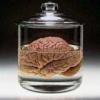Fair enough, though I don't think this is an issue of the scientific method. I'm still curious to know by what mechanism does religion accept new views - that things once thought to be not true, are now accepted as true?
There are tons of religious councils through the years that completely rewrite parts of the catholic catechism. edit: the most recent being vatican 2
What about evolution are you arguing against here, specifically? What experiments are you referring to?[/quote]
http://amasci.com/freenrg/evolv.txt
That explains the issues with the existing theory of evolution from the perspective of a scientist.
I do not see evidence for the claims. The claims tend to be cases which have either been disproved, or are unfalsifiable.
What is this evidence that can't be shared? Oh of course, you can't share it - couldn't anyone claim this about any belief they held, no matter how irrational it seemed?
[/quote]
There is nothing irrational with making claims that are un-falsifiable. There is a stark difference between something that seems irrational and something that is irrational.
Unscientific is not a synonym for irrational. Rationality deals purely with logic, which is not concerned with the existence of evidence only that an argument is consistent with the evidence that exists. For example:
1. if A then B
2. if B then C
3. if A then C
Is totally rational though there is no evidence and isn't really falsifiable. It's logically consistent.
As far as I know nobody has logically disproven God, so there's no reason to think that all religious people are irrational; certainly there are many who are, but that's true of any group of people really.








